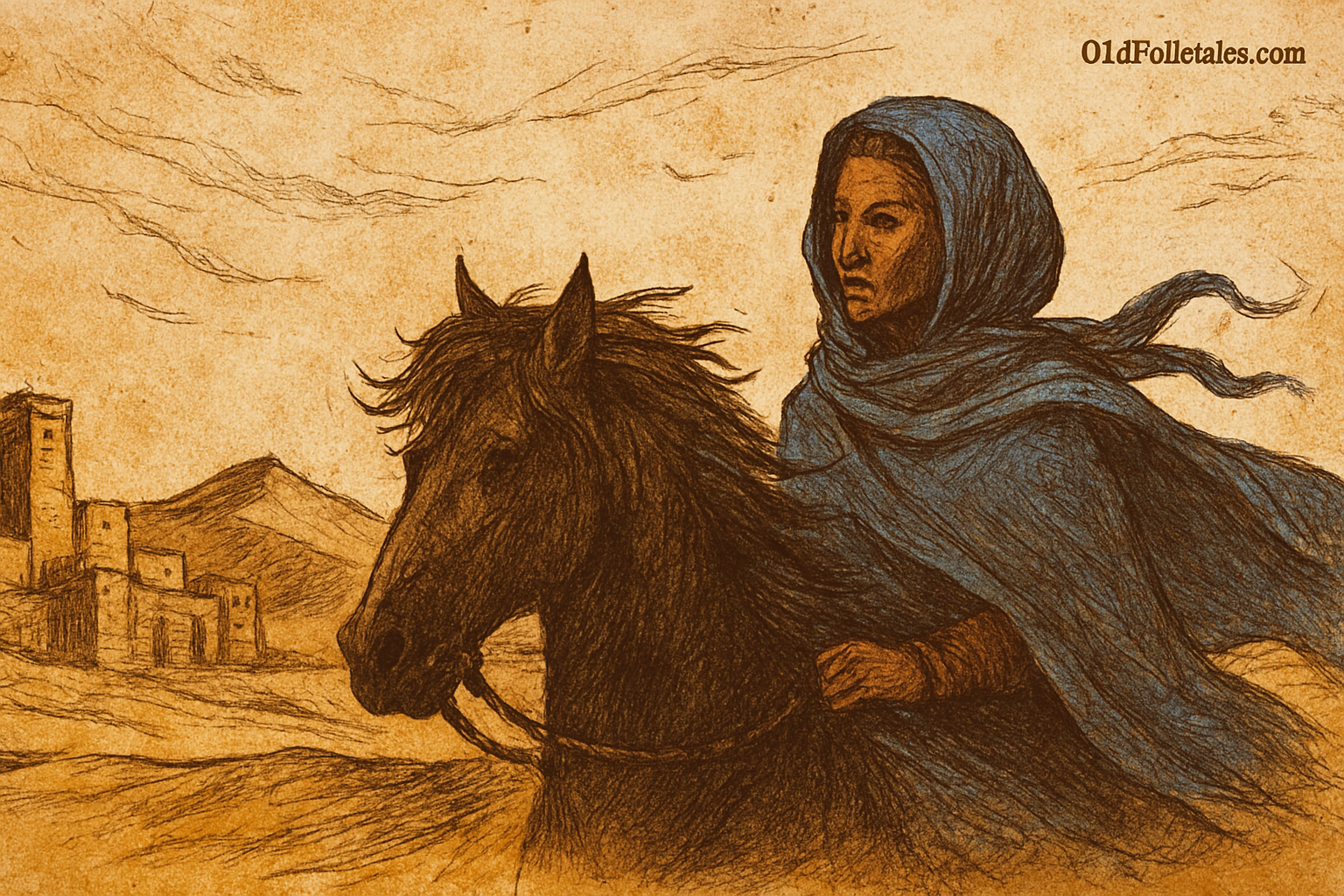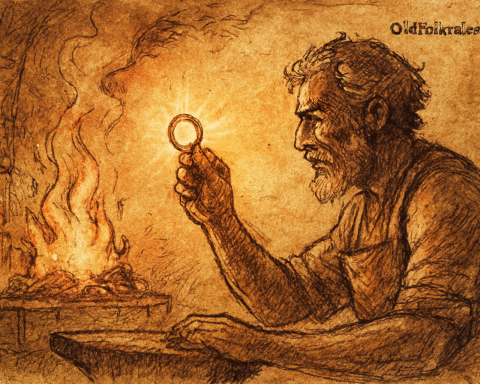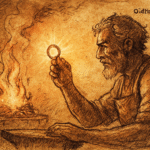The desert sang its eternal song at night not a melody that could be heard with mortal ears, but a haunting tune carried on the restless wind, weaving through the towering dunes like the spirit of an ancient age long forgotten by time. The great Sahara stretched endlessly in all directions, a vast sea of golden waves beneath the star-studded celestial expanse, a land of breathtaking beauty and merciless cruelty where the blazing sun scorched the earth by day and the bitter cold bit at exposed flesh through the long desert nights.
Amid this endless expanse of sand and stone lay the beating heart of the mighty Mali Empire, the legendary city of Timbuktu, a glorious center of learning where scholars, wealthy merchants, and powerful kings gathered from across the known world. Here, precious knowledge and gleaming gold flowed as freely as the life-giving waters of the Niger River, creating a crossroads of civilization in the heart of Africa. But beyond its celebrated wealth and renowned wisdom, the empire remained a place of shifting political alliances and dangerous power struggles, where ambition and betrayal hid behind silk veils and jeweled crowns.
And in the midst of all this imperial intrigue stood a young woman who refused to be bound by the chains of fate or tradition.
Also read: The Talking Hippos of Mopti
Her name was Aissata, the only daughter of Mansa Kabe, the formidable ruler of the empire’s western provinces. She was born into the highest nobility, destined from birth for a life wrapped in silk and shadow, where her sacred duty was to marry strategically and secure vital alliances for her father’s expanding kingdom. Yet the fierce blood of ancient warriors flowed through her veins like liquid fire. From the earliest time she could walk on unsteady legs, she found herself drawn not to delicate embroidery and refined courtly manners, but to the exhilarating clash of steel against steel and the wild, untamed call of the infinite dunes.
Princess Aissata sat regally atop her magnificent black stallion, Suma, watching with troubled eyes as the distant horizon caught fire in the brilliant light of the setting sun. The restless wind tugged insistently at the loose folds of her flowing indigo robe, whipping countless grains of sand against her dark skin like tiny, stinging messengers from the desert’s heart. The Sahara stretched before her like an unconquered kingdom all its own, bound to no earthly man or temporal ruler.
How desperately she longed for that kind of absolute freedom.
Behind her, the imposing walls of her father’s ancient stronghold stood tall and proud, their weathered stone faces bearing the scars of countless years of time and war. Inside those walls, elaborate preparations were already being made for her unwanted betrothal, a political marriage she neither desired nor requested, to a man whose face she had never seen and whose heart she would never know.
Prince Jafar of Gao. His very name was spoken throughout the empire with a mixture of deep reverence and paralyzing fear. He was a renowned warrior, known far and wide for his brutal military conquests and his ruthless political ambition that knew no bounds. Princess Aissata had never laid eyes upon this man who would claim her as his prize, but she had certainly heard the whispered rumors that followed in his wake. He was not a man who accepted defeat or denial gracefully.
She gritted her teeth in defiant determination. She had fought her entire life to prove she was more than a mere pawn in the deadly games played by powerful men, to demonstrate to her father that she possessed value beyond being a daughter to be bartered away like precious goods in a trade agreement. And yet, here she found herself, about to be sent away like a piece of gold in a diplomatic transaction.
Suma shifted restlessly beneath her, his keen animal senses detecting her mounting frustration and inner turmoil. “I will not be caged like some exotic bird,” she murmured to her faithful horse, running her fingers through his silky black mane. “I will not belong to him or any man.”
The life-changing decision settled deep in her bones like immovable stone. She would leave this place forever. Before the sun rose to herald another day, she would be gone, vanished into the desert like a mirage.
The bustling city of Timbuktu pulsed with vibrant life, sound, and brilliant color. Shrewd merchants haggled energetically over bolts of rich cloth and fragrant baskets of exotic spices, while learned travelers from distant lands exchanged glittering gold for precious knowledge in the city’s world-famous libraries and centers of learning. The tantalizing scent of roasting lamb and precious saffron hung heavy in the air, mingling intoxicatingly with the ever-present dust of the crowded streets.
Aissata moved through the bustling crowd like a silent shadow, her deep blue veil pulled low over her distinctive features to conceal her royal identity. She had slipped away from the fortress under the protective cover of darkness, riding her beloved Suma through the dangerous night until she reached the relative safety of the city’s maze-like streets.
She was not traveling alone in her desperate flight. Beside her walked Zayd, a beloved childhood friend who had long since abandoned the comfortable luxuries of noble life for the harsh freedom of the desert’s embrace. He had been many things in his adventurous life a cunning thief, a successful trader, a charming rogue but never once a traitor to those he loved.
“I should have known you would run,” he said with a knowing smirk playing at the corners of his mouth. “You never did enjoy following anyone’s orders, even as a child.”
She shot him a sharp, warning look. “I desperately need your help, Zayd.”
The young man sighed deeply, recognizing the serious determination in her voice. “I suppose you want to disappear completely from the world.”
“I need warriors,” she said with fierce intensity. “Men who answer to no kings or earthly rulers.”
His playful smile faded immediately as understanding dawned. “The Tuareg.”
The mysterious Tuareg camp lay hidden deep in the heart of the desert, concealed among towering dunes that shifted with the wind’s whims. Their legendary warriors watched Princess Aissata with unreadable eyes as she dismounted gracefully from Suma’s back. Their leader, the respected Sheikh Amar, stood before her with quiet dignity, his weathered face hidden behind the traditional deep blue veil of his people.
“You come seeking refuge from your troubles?” he asked, his voice carrying the ancient wisdom of the shifting sands themselves.
“I seek freedom,” Aissata replied with unwavering conviction.
The sheikh studied her intently for a long, measuring moment before speaking again. “Freedom is earned through struggle and sacrifice, young princess, never simply given as a gift.”
And so began the most challenging trials of her sheltered life. For many grueling weeks, Aissata trained relentlessly alongside the fierce Tuareg warriors, learning their ancient ways of survival and combat. She mastered the deadly takouba, the curved sword of the desert peoples. She became skilled with the bow, learned to track her way by the eternal stars, and discovered how to ride through the treacherous dunes with nothing but the wind at her back for guidance.
The Tuareg showed her no mercy or special consideration for her royal birth. She was tested again and again in ways that pushed her far beyond her limits until at last, she stood before Sheikh Amar once more, her body covered in bruises and her spirit exhausted, but her will utterly unbroken.
“You have proven your strength,” he acknowledged with respect, “but strength alone is insufficient. What will you do with the freedom you seek?”
Aissata clenched her fists with renewed determination. “I will not allow Mali to fall into the grasping hands of tyrants and oppressors. I will never again be used as a tool for Jafar’s selfish ambitions.”
A profound silence fell over the assembled warriors like a heavy blanket. Then, slowly, Sheikh Amar nodded his approval. “Then you are truly one of us, sister of the sands.”
The sun rose majestically over the desert landscape, painting the endless sky in brilliant shades of fire and gold. On the distant horizon, the war banners of Gao rippled ominously in the morning wind, announcing the arrival of her greatest enemy.
Prince Jafar had come to claim his prize.
Princess Aissata stood proudly at the head of the Tuareg warriors, her gleaming takouba held firmly in her capable hand. She had trained relentlessly for this pivotal moment, had bled and suffered for it, had transformed herself from a sheltered princess into a true warrior of the desert.
Prince Jafar rode forward confidently on his war horse, his polished armor gleaming like liquid silver in the harsh sunlight. “You cannot hope to win this fight, Aissata,” he called out with arrogant certainty. “Come to me willingly, and I promise to show you mercy.”
She smiled coldly, her eyes blazing with defiant fire. “You mistake me for someone who fears you, Prince. That woman no longer exists.”
With a fierce war cry that echoed across the dunes, she spurred her horse forward, leading the charge into battle. The brutal conflict raged under the merciless sun as arrows sliced through the air like deadly birds, steel clashed against steel in deadly harmony, and the pure sand ran red with the blood of warriors.
At last, Princess Aissata faced Prince Jafar in single combat, their swords meeting in a deadly dance of skill and determination. “You could have been my queen,” he snarled through gritted teeth as their blades locked together.
“I was never yours to claim,” she replied with icy conviction. With one swift, expertly executed movement, she disarmed him completely. He fell heavily to his knees in the sand, utterly defeated by the woman he had sought to possess.
The desert had chosen its victor.
The war was finally over, its echoes fading into desert legend. Prince Jafar was thoroughly vanquished, and a hard-won peace returned to the Mali Empire like the calm after a terrible storm.
Princess Aissata rode back to her father’s stronghold, no longer as a helpless princess to be bartered away in political marriages, but as a proven warrior, a respected leader, and a living legend whose name would echo through the ages.
Her story would be whispered on the desert wind for countless generations to come, a tale carried by the eternal sands to inspire future daughters who refused to accept the limitations placed upon them by others. The Princess of the Sands had become something far greater than royalty, she had become truly free.
The Moral Lesson
This powerful tale teaches us that true freedom must be earned through courage, determination, and the willingness to forge our own path, even when it defies tradition and expectation. Princess Aissata’s journey shows that we have the power to shape our own destiny, but only if we are brave enough to fight for it and strong enough to prove ourselves worthy of the freedom we seek.
Knowledge Check
Q1: Who was Princess Aissata in this Mali Empire folktale? A: Princess Aissata was the daughter of Mansa Kabe, ruler of the western provinces of the Mali Empire. She was a royal princess who refused an arranged marriage to Prince Jafar of Gao and instead fled to the desert to train with Tuareg warriors, ultimately becoming a legendary warrior herself.
Q2: What role did the Tuareg people play in Princess Aissata’s story? A: The Tuareg were nomadic desert warriors who lived independently of the Mali Empire. Led by Sheikh Amar, they agreed to train Princess Aissata in desert warfare and combat skills after she proved her determination through rigorous trials, ultimately accepting her as one of their own.
Q3: What cultural significance does the Sahara Desert hold in this West African legend? A: In this Mali folktale, the Sahara Desert represents freedom, independence, and the untamed spirit that cannot be conquered by earthly rulers. It serves as both a refuge for those seeking liberation and a testing ground where true character is revealed through hardship and challenge.
Q4: Who was Prince Jafar and why was he considered a threat? A: Prince Jafar of Gao was a powerful warrior prince known for his military conquests and ruthless political ambition. He represented the patriarchal system that sought to control Princess Aissata through an arranged marriage, making him the primary antagonist in her quest for freedom.
Q5: What weapons and skills did Princess Aissata learn from the Tuareg warriors? A: Princess Aissata mastered the takouba (the curved sword of the desert), became skilled with the bow and arrow, learned to navigate by the stars, and developed the ability to ride through dangerous dunes using only the wind for guidance all essential skills for desert warfare.
Q6: What does Princess Aissata’s transformation symbolize in West African culture? A: Princess Aissata’s journey from sheltered royalty to desert warrior symbolizes the triumph of personal agency over societal expectations, representing the African cultural values of courage, self-determination, and the belief that individuals can transcend the limitations imposed by traditional gender roles and political systems.
Source: Traditional legend from the Mali Empire region, West Africa



